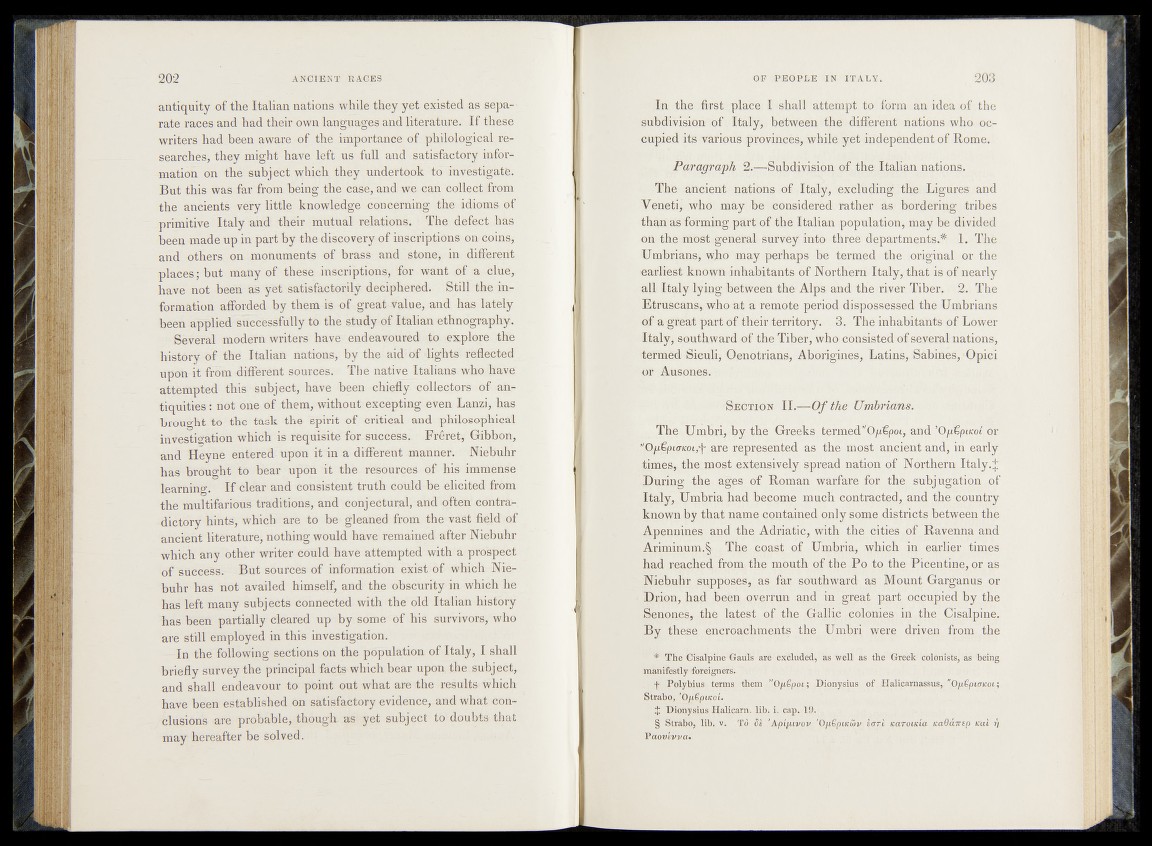
antiquity of the Italian nations while they yet earieted-a&fépa- •
rate races and had their own languages and literature. <,If these
writers had been aware of, the importance*; of .philological researches,
they might have d'pft, us full and' satisfactory information
on thé“ subject,which they undertook ffcT investigate.
But this was far from being the case,’and we can colleet^Éfom
the ancients, very little knowledge sóoneerning the idioms Of
primitive Italy'and their mutual relations. The defect, has
been made up in part by the discovery of inscriptions, on coiner
and others on monuments of brass and stone, in different
places; but many of these inscriptions, for wanivpf a^Blue,
have not been as yet satisfactorily deciphered. Still the information
afforded by them is of greaUfalue, and has lately
been applited snccessfully to the study of Italian ethnography.
Several modern writers have' endeavouredt io explore th é
history of the Italian nations, by the aid of -lights reflected
upon it from different sources. The native -Italians whoihave'
attempted this subject, have been chiefly VcdMbctors bfr-ahr
tiquities: not ©he of them, without excepting even Lanzi, - has
brought to the task the spirit of critical and philosophical
investigation which is requisite for success.. Frêrety Gibbon,
and Heyhe entered upon it in a different manner^ : -Niebuhr
has b r o u g h t to bear upon it the resources - dfrhisfmménse
learning. Ifulear and consistent truth couldbe elicitedfëèto
the multifarious traditions, and conjectural, and often contra-,
dictbry hints, which are to be gleaned from the^yast fi^ld of
ancient literature, nothing would have remained after Niebuhr
which any other writer could have attempted with a:pró‘sf>eet
o f success. But sources of information exist of which ■Nier
buhr has not availed himself, and the obscurity in which he
has left many subjects connected with the old Italian history
has been partially cleared up by. some of his survivors, who
are still employed in this investigation.
—In the following sections on the population of Italy, I shall
briefly survey the principal facts which bear upon, the.subject,
and shall endeavour to point out what are the results which
have been established on satisfactory evidence, and what conclusions
are probable, though- as- yet subject*lb doubts that
may hereafter be solved.
In »first ,pla(?ei I shall attempt to f<3rm .an idea <a£ ,tbe
subdivision o f. Italy, between •• the - different nations who. occupied
-itf^varipds ;pTovincesy while<yet independehfeof Rome.
Paragraph 2.W,Subdjyi^ion of,the^it.alian natipng.
The ancient*•natifons b^Italyt,' excluding the-. Ligures and
Venetfl’whQ mayb^^bnsidered rathefl'as/ bordering tribes
th^ttavS'forming,p£trt‘of the Ital!ahw}p,o.pulation, may be divided
qjiLthe mo^genq^alfsnrvcyftt^ot^hrefM^p^tments.* 1. Tbit
Umbria&sy who may perhaps be ferhatedctthe, loriginal or the
-earliest known inhabitant! of^nrtherh.ItalyythataS of nearly:
all 1 tafyIyi*n;g4between the Afpk and the riyfoiTiben, k%l2. The
'^truscans, who a t a remote period»d isq lossbkstnhtfee Umbrians
of a'great part» dfr their ;ter ritqr y ^ t l^ The-iuhaMiants of Lower
Italyl-sfejuthward of^MesTiber, wh ^cb h s^ ed ii@£several natiqn%
|lten€jd Siculf, O^notrians, Aborigines, Latins, ^M»J|e^t!|lpici
or Ausones,4: •
^^StÉforroN 11 .-^ 0 / th^Umhrians.
The Umori, hy the Greeks or
I'PpgpiaKotif^re represented as the moét* ancient and, in early,
,4imep,t the most extensively spread nation: ,q||Nórthern Italy.\
During the* ages of Roman warfare for the suhjjjration , qf
Italy, Umbria had become much cpnfrhcted, jänd thé;c.ouütry
known by that name contained P P JyV qme^Mn c'^^ tw e^!the
Apennines ancf the AdriatteWvjth the^GitieÉmf Ravenna and
AriminumAi. T h e rcpast of .Umbria, which iff earijefctinies'
had reached fronouthe mouth of thé.-Po to the tpcenrijne, or as
Niebuhr supposes, as far southward as Mount Ga^ganus or
Drion, had been overrun and ipfgreat part cpcnpied hy th e
Senones, the latest.of the;,Ganic.polonies; in the Qisalpine.
By these encroachments the Umbri^ jverp driven from, the
* The Cisalpine Gauls arè ‘ exéludéd, as vtell as the (xreék: colonists, as being
manifestly 'foreigners, di
Polybius terms -them ”O p € f)o i; , Dionysus of Halipamassusy '.tÄ fjtt|ji^ ;;
Strabo, ’O/iÊpujot.
J Dionysius Haljcarn, lijbj i, cap,|19,ju
§ Strabo, lib. v. Tó Jt-Aspiptvov O p ^S pm ß v i écrui kcltoikIo. KaOdyrsp Kill jj.
P ’cio v s v v a .